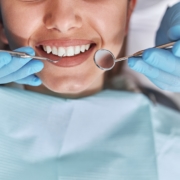April is Oral Cancer Awareness Month
Oral cancer is any type of cancer that forms in the mouth, including the lips, gums, tongue, cheeks, and roof or floor of the mouth. According to the American Cancer Society, around 55,000 cases of oral cancer are diagnosed each year and 11,000 people die from the disease. As part of Oral Cancer Awareness Month this April, Vacendak Dentistry is committed to raising awareness about oral cancer.
Risk Factors
Tobacco and heavy alcohol use are risk factors for developing various mouth cancers. Other risk factors include having a weakened immune system or HPV (human papillomavirus), as well as extreme sun exposure to the lips without sunscreen. A family history of oral cancer can also increase your likelihood of developing the disease.
Signs and Symptoms
During regular dental exams, dentists look for signs of cancer or precancerous conditions in the mouth and can raise a red flag should further evaluation be needed. Dentists look for red or white patches or mouth sores. They also use a gloved hand to feel the cheeks and gums for any abnormal lumps. Should a dentist find something unusual, they will either recommend that the patient follow-up with them in a few weeks or refer the patient to an ear, nose, and throat doctor.
Patients may also report symptoms that could indicate oral cancer. These symptoms include mouth sores, loose teeth, growing lumps, mouth pain, ear pain, and difficulty swallowing. While these can be caused by many other conditions, patients should tell their dentist if they are experiencing any of the symptoms.
Treatment
To determine if an area of concern is in fact oral cancer, physicians will perform a biopsy. Depending on its type and severity, oral cancer is treated with surgery, radiation, chemotherapy or a combination of the three. Targeted drug therapies and immunotherapies can also be used to treat oral cancer. If needed, reconstructive surgery can be performed after treatment.
Prevention
To prevent oral cancer, don’t use tobacco products and only drink alcohol in moderation. Use sunscreen, especially on the lips, and get vaccinated for human papillomavirus. Eat a balanced diet and schedule regular dental appointments.
Oral cancer screenings at the dentist’s office are critical to detecting cancer early. To make your next appointment, call Vacendak Dentistry at 757-609-3510 or request one online.



